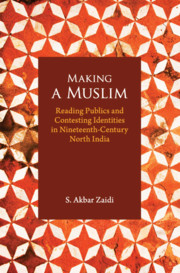Introduction
Published online by Cambridge University Press: 24 March 2021
Summary
Maulvi Sayyid Imdadul ‘Ali Sahib, Deputy Collector Bahadur, Kanpur and later of Aligarh, was one of the earliest and most vociferous critics of Sayyid Ahmad Khan (1817–98), one of the most prominent Muslim reformists in colonial India. The noted essayist, writer and poet Altaf Husain Hali (1837–1914) had called Imdadul ‘Ali one of the two most important people who campaigned against Sayyid Ahmad. In AH 1289/AD 1872, Imdadul ‘Ali published his Imdād ul-Āfāq ba-Javāb-i Parcha-yi Tahzīb ul-Akhlāq as a forceful reply to the publication Tahzīb ul-Akhlāq, not long after Sayyid Ahmad Khan founded his journal in 1871. On the very last page of Imdadul ‘Ali's 88-page diatribe against Sayyid Ahmad Khan, we learn why he wrote the tract. His spirit and core beliefs about Islam were provoked, he said, and he became angry and immediately wrote this tract in reply to Tahzīb ul-Akhlāq. This trend of ‘becoming angry’ after reading something and being compelled to write, often ‘immediately’, became quite commonplace, certainly amongst the ashrāf (well-born) of Hindustan, even at a time when ‘print capitalism’ was still in its early phases. Imdadul ‘Ali continued by saying that Tahzīb ul-Akhlāq was not only far removed from Islam but was blasphemous. In order to protect the beliefs of his Muslim brethren, he had his own text published and distributed for free. Sayyid Ahmad Khan had written to many individuals, including Imdadul ‘Ali, seeking their help when he began to plan the establishment of his college at Aligarh.
After spending many pages on what constituted a proper ‘Muslim dress’, Imdadul ‘Ali moved on to Sayyid Ahmad Khan's planned dress code for the Madrasat ul‘ulum Musalmanān (Muhammadan Anglo-Oriental College). He quoted Sayyid Ahmad, who wrote that each student would have to come to the madrasa wearing socks and shoes. Imdadul ‘Ali felt that Muslims would object to this, saying that while this madrasa was supposed to be meant for Muslims, by imposing a condition of wearing āngrezī jūtā (British shoes) it would force people away from their Islamic dress and they would begin to find the British style more pleasing. He argued on the basis of a hadīs (prophetic tradition) that Muslims should dress in a manner that was distinct from non-believers, and that they were prohibited from copying them.
- Type
- Chapter
- Information
- Making a MuslimReading Publics and Contesting Identities in Nineteenth-Century North India, pp. 1 - 29Publisher: Cambridge University PressPrint publication year: 2021



